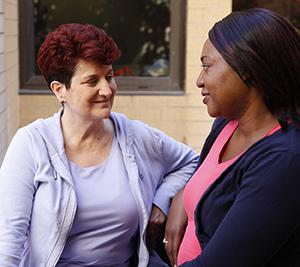Menopause is the point where you’ve gone 12 months in a row with no menstrual period. The average age for this is around 51. But it can happen at younger or older ages. In the months or years before menopause, called perimenopause, your body goes through a lot of changes. This usually begins between 45 to 55 years of age. It can help to understand these changes and what you can do to ease the symptoms.
Symptoms
In the months or years before menopause, you may have symptoms as your hormones change. They may start when you reach your mid-40s. During this time, your estrogen level goes up and down. Then it decreases. As a result, you may have:
-
Menstrual periods that come less or more often.
-
Periods that are lighter or heavier.
-
Worse premenstrual syndrome (PMS) symptoms.
-
Hot flashes (a sudden feeling of heat in the body, often in the upper part of the body).
-
Night sweats.
-
Mood swings.
-
Vaginal dryness and pain during sex.
-
Trouble going to sleep or staying asleep.
-
Lower sex drive and function.
-
Weight gain.
-
Needing to pee often.
Controlling symptoms
Your health care provider may suggest pills or an intrauterine device (IUD) that have the hormone progesterone. This can make your periods more regular. It also can prevent excess bleeding. If you have symptoms due to lower estrogen levels, your provider may suggest pills that have estrogen or progesterone. This is called hormone therapy.
There are other prescription medicines that help control some of the symptoms. Low moods or depression may be treated with antidepressants. Loss of bone mass around menopause may be treated with medicines. Exercise not only helps improve muscle and bone mass but also helps take care of low moods.
Below are ways for you to help ease symptoms:
-
Hot flashes. Wear layers that you can take off. Try all-cotton clothing, sheets, and blankets. Keep a glass of cold water by your bed.
-
Pain during sex. A water-based lubricant or vaginal moisturizer may help. You may get an estrogen cream for your vagina.
-
Mood swings. Talking with friends who are going through the same changes can help.
A healthy diet and regular activity can help ease symptoms and improve your overall health. Restful sleep and not smoking or drinking alcohol also may help. You can meditate or find other ways to relax. These can improve your mental health.
Using birth control
You can still get pregnant until 12 months have passed since your last period. Ask your health care provider about birth control choices.
Featured in


